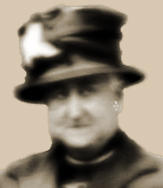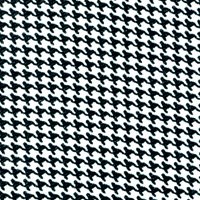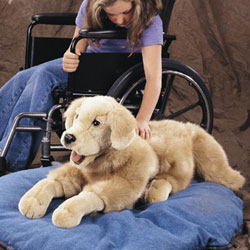There are few things more calculated to raise Lady Bracknell's spirits than a good thunder storm.
That this is so will be partly to do, she admits, with the fact that she is constitutionally unsuited to conditions of high humidity, and therefore looks forward to storms as the harbingers of a fresher atmosphere. Younger, slenderer readers may as yet be unfamiliar with the experience of swollen ankles resulting from shifts in barometric pressure, but Lady Bracknell can assure them that, whilst they may be comic in appearance, they are No Joke.
But even as a child - in those halcyon days when her ankles did not inflate and deflate of their own accord - Lady Bracknell was so enamoured of the dramatic power of thunder storms that she would rush outside, arms spread wide and face tilted upwards, to experience them at closer quarters.
Not so the two young women who were passing Bracknell Towers when the storm broke yesterday, and who shrieked quite abominably in response to every clap of thunder.
Can any of Lady Bracknell's readers enlighten her as to the origin of this (singularly unpleasant) modern fad for shrieking at an ear-splitting pitch? Whilst it is understandable in tiny children for whom almost everything is new and exciting, it is quite unforgivable in any woman who is legally of adult status.
And yet shrieking seems - at least, it does if the female Big Brother contestants can be considered to be representative of their generation - to have been adopted for occasions as verbally undemanding as simply greeting one's friends. Has the constant exposure to noise pollution which is the very bane of our modern existence damaged young women's hearing to such an extent that a cheerfully spoken, "Hello", would be inaudible to them? Why does life need to be lived at a constant fever pitch of excitement? And is it not very tiring to one's nervous system to do so?
Lady Bracknell is aware that she herself has a very
carrying voice. There is little she can do to alter that fact, but she is confident that even her worst detractors would not describe her as shrill. Her voice may not be "ever soft, gentle and low" but it is, at least, sufficiently deep that it does not cause her interlocutors to flinch. (They may flinch at what she
says, but that is a different issue.)
But Lady Bracknell has digressed. (The young, slender readers who are currently admiring their neat ankles should be aware that digression is another thing which increases with age.) Back to storms.
One is unlikely to have a thunder storm without rain. Rain is, by its very nature, wetting. (Lady Bracknell's favoured rejoinder to the fretting, "But you're not carrying an umbrella: what on earth will you do if it rains?", is a clipped, "I shall get wet". To which, if she is feeling particularly truculent and/or modern, she is often tempted to append a rather discourteous, "And?".)
Getting wet in the rain is another of those mundane experiences which really does not justify a full-scale drama. Rain is such a frequent visitor to our shores that Lady Bracknell is at a loss to understand why people are so often astonished when they feel the first drops land on their heads. Unless one will have no option but to sit in wet clothes in an unheated room for several hours, there is really no peril to one's health. One is not living in Dickensian London. One will not dissolve: the human skin is remarkably impervious to water.
It is Lady Bracknell's belief that huddling in doorways will not improve one's experience of walking through the rain one whit. Unless the doorway is singularly capacious, one is almost always left dry on one side and drenched through on the other, a sensation which is considerably more unpleasant than being wet all over. No, the thing to do is to stride out briskly (or as briskly as one can manage) and get the thing over with.
Women who sport coiffures which can not withstand a shower of rain have the option of either investing in one of those transparent plastic rainhoods which independent pharmacists display next to the tins of glucose travel sweets, or changing to a less frivolous hairstyle. Better either of those alternatives, quite frankly, than shrieking like a thwarted toddler at the onset of rain.














